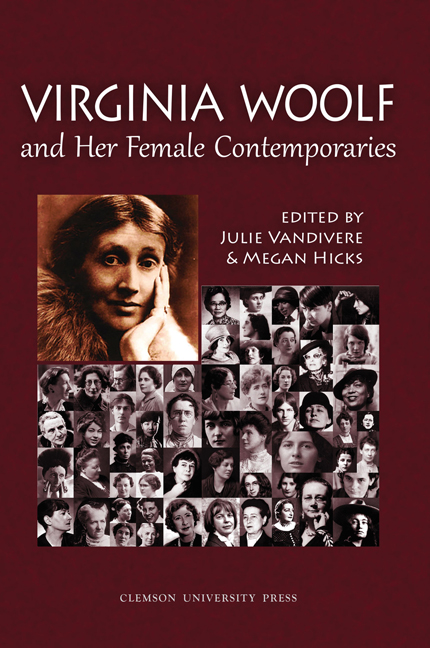Book contents
- Frontmatter
- Table of Contents
- Introduction
- Acknowledgments
- Abbreviations
- Who Are Virginia Woolf's Female Contemporaries?
- Virginia Woolf's Cultural Contexts
- Virginia Woolf and the Book Society Limited
- The Outsider as Editor: Three Guineas and the Feminist Periodical
- Woolf 's Imperialist Cousins: Missionary Vocations of Dorothea and Rosamond Stephen
- Mary Sheepshanks, Virginia Stephen, and Morley College: Learning to Teach, Learning to Write
- Moving Picture This: Virginia Woolf in the British Good Housekeeping!? or Moving Picture This: Woolf 's London Essays and the Cinema
- “Quota Quickies Threaten Audience Intelligence Levels!”: The Power of the Screen in Virginia Woolf 's “The Cinema” and “Middlebrow” and Betty Miller's Farewell Leicester Square
- Virginia Woolf's Contemporaries Abroad
- Virginia Woolf's Contemporaries at Home
- Tribute to Jane Marcus
- Notes on Contributors
- Conference Program 223
Virginia Woolf and the Book Society Limited
from Virginia Woolf's Cultural Contexts
- Frontmatter
- Table of Contents
- Introduction
- Acknowledgments
- Abbreviations
- Who Are Virginia Woolf's Female Contemporaries?
- Virginia Woolf's Cultural Contexts
- Virginia Woolf and the Book Society Limited
- The Outsider as Editor: Three Guineas and the Feminist Periodical
- Woolf 's Imperialist Cousins: Missionary Vocations of Dorothea and Rosamond Stephen
- Mary Sheepshanks, Virginia Stephen, and Morley College: Learning to Teach, Learning to Write
- Moving Picture This: Virginia Woolf in the British Good Housekeeping!? or Moving Picture This: Woolf 's London Essays and the Cinema
- “Quota Quickies Threaten Audience Intelligence Levels!”: The Power of the Screen in Virginia Woolf 's “The Cinema” and “Middlebrow” and Betty Miller's Farewell Leicester Square
- Virginia Woolf's Contemporaries Abroad
- Virginia Woolf's Contemporaries at Home
- Tribute to Jane Marcus
- Notes on Contributors
- Conference Program 223
Summary
“As people read more books they will read better books; they will also realize the pleasure of owning the books they read instead of borrowing them from a library.”
—Virginia Woolf (“Are Too Many” 243)In her BBC radio debate with Leonard in July 1927, Virginia Woolf foresaw the appeal of what would shortly become the Book Society Ltd., a mail-order book club modelled on the American Book-of-the-Month Club established the preceding year. Woolf worked with the English Book Society and came into contact with its large, worldwide membership as both publisher and author, a perhaps unlikely relationship facilitated by her friendship with Hugh Walpole (Book Society chairman) and other members of its “distinguished” selection committee. Flush (1933) was a Book Society Choice; Woolf 's work appeared regularly amongst the club's recommended titles, and her name often featured as cultural touchstone in the monthly Book Society News (BSN). Business correspondence in the archive of the Hogarth Press indicates the extent to which the Woolfs were willing to negotiate with the Book Society throughout the 1930s and how much impact the Book Society's demands could have on the production schedules, prices, and occasionally upon the material production of Hogarth Press texts.
Bearing in mind the recent surge of academic interest in the so-called middlebrow and the continual push to reread Woolf in various contexts, this paper seeks to reposition Virginia Woolf as a Book Society, book-club author. For contemporary readers and paying members of the Book Society who received a selected text each month, Virginia Woolf 's titles sat amongst other volumes on the bookshelf by popular Book Society authors. In terms of Woolf 's female contemporaries, this is a varied list that includes Rosamond Lehmann, Margaret Irwin, Ann Bridge, Vita Sackville-West, Winifred Holtby, Dorothy Whipple, Rebecca West, Elizabeth Bowen, and Enid Bagnold. If we broaden our list of popular Book Society authors to include male writers, we incorporate bestsellers like C. S. Forrester (author of the still-popular “Captain Hornblower” series).
- Type
- Chapter
- Information
- Virginia Woolf and Her Female Contemporaries , pp. 48 - 55Publisher: Liverpool University PressPrint publication year: 2016



